
Photo: via Tech Daily
When you devote several years of your professional life to working in a sector and the results feel frustrating, it is time to step back and reflect. The field of open data has an army of dedicated, hard working professionals, but reports suggest impact remains stubbornly limited. A new piece of work we are sharing today proposes that we need to think about how we organize, fund and execute these efforts in more coordinated and methodical ways. This short piece of work is a collaboration between the Transparency and Accountability Initiative (TAI) and the Open Data Charter (ODC), and while it focuses on transparency, it has applicability for open data work for other aims.
Through my work as an open data “expert,” I have seen the challenges inherent in donor funded projects in developing countries first hand. I recently spent a week in a basement working with smart, talented and driven officials training them to clean, license and publish digital information. When going for tea at the end of the week to celebrate, I was then brought through room after room stuffed with slumping stacks of handwritten paper records going back years – decades even.
I have sat down with one of a country’s few data journalists, trained to a high standard in data processing and visualization, and listened to him talk about struggling with the craft of creating the compelling narratives that can move people, while treading the invisible line that keeps his paper from attracting the attention of repressive authorities.
It is not novel to say that in development, good ideas can sometimes undergo a disabling process of simplification and division for the sake of program design and implementation.
If translating a complex idea into reality in development were like making a roast chicken dinner, there would be one highly funded team removing giblets with surgical precision, a civil society organization preparing vegetables, everyone assuming someone else is setting the table, and an academic sitting in the corner whispering that the kitchen has no power and you can’t eat raw chicken, no matter how well garnished it is.
We at TAI and ODC believe that the open data sector is small enough to be able to do things better, and differently. If we are going to improve as a sector and deliver impact – to get people fed with that chicken – we need to understand the complex system connecting data to impact. Then we need to coordinate our investments and program so that they support the system as a whole.
We have developed a first draft of what we think that system looks like, and we would value your comments to improve it (email us at [email protected]). This framework reflects the value chain of data – flowing from generation to use to action and reaction. Our aim is that a framework such as this can then be used to understand where gaps exist in funding and support, at both local and international levels.
For this draft framework, we started with that existing idea of data “availability and use”, that currently frames a lot of work, and added to it. We added an understanding that the good quality production and management of data is a key prerequisite for data sharing – turning those stacks of paper into digital processable files.
From work in the field of transparency and accountability, we added the analysis that being able to access and process data is important but it is not the same thing as being able to produce an action. In addition, this is not the same as the conditions being in place for this action to lead to a response – for some sort of change in the world. The data journalist above can be more impactful if he can mix his data processing skills with the skills and civic space to demand action to address the challenges he identified in his data analysis.
TAI / ODC draft framework for understanding the open data for the accountability field
Taking an example to illustrate this, I recently worked with some journalists at the Guardian for a story on funding of the Brexit campaign. There had been questions raised in the media about high levels of spending by one party, the Northern Irish DUP, which benefits from a legal loophole allowing it to accept anonymous donations for campaigns. Publication of this and other articles forced the party to give some information on its donors.
Analysis of official, open data on election spending meant that questions already raised could be answered and a story could be written. However data publication and use were but one small if necessary part of the system that enabled this: there was legislation – and enforcement – in place for campaign spending information to be maintained and shared; there were journalists and activists raising questions; there was a healthy, credible and (relatively) well funded press to write and publish the story. And even then, there has yet to be a real response – a change to the conditions that enabled this to take place.
The more clearly we can understand these systems, the better equipped we are to develop and fund programs that work together to achieve real change. Let us know what you think of our first attempt to build a framework, that we hope will serve as a conversation starter and that will no doubt evolve with feedback.
Please send your comments and suggestions to [email protected]
This is cross posted on the Open Data Charter website.


